
After years of intergenerational living, bickering debates, and emotional milestones, the Bunkers finally find themselves with a quiet house in the All in the Family episode titled “Alone at Last.” Airing shortly after Michael and Gloria move out, this episode cleverly and tenderly explores what it really means to be “empty nesters”—with all the awkwardness, freedom, and unexpected emotion that comes with it.
The New Silence in the Bunker Home
The episode opens with an unfamiliar setting: silence. With Mike, Gloria, and little Joey off to California, Archie and Edith are alone in their home for the first time in years. But the peace is short-lived. Archie quickly realizes that without someone to argue with—namely Mike—his days feel… too quiet.
Archie, ever the creature of habit and control, struggles to adapt to this new chapter. His usual outlets for frustration are gone, and even his favorite chair feels a little colder. While he would never admit it, it’s clear that Archie misses the noise, the chaos, and—most of all—the connection.
Edith’s Optimism and Adjustment
As always, Edith meets change with grace. While she also misses Gloria and Joey deeply, she sees their absence as an opportunity for renewal. She lovingly suggests ways to reconnect as a couple, spend more time together, and even try new things. Her optimism is charming, but also a little sad—because even she can sense that Archie may not be ready for this next phase.
Still, Edith’s quiet strength shines. Her efforts to rekindle romance, conversation, and companionship reflect a deep emotional intelligence. Through her, we see how some people find purpose in adapting to change rather than resisting it.
The Comedy of Relearning Intimacy
“Alone at Last” isn’t just an emotional meditation on aging—it’s also genuinely funny. Archie and Edith, who have been so used to having others around, now have to rediscover what it’s like to be just the two of them. The episode finds humor in their awkwardness—from cooking dinner for two, to miscommunicated expectations, to moments of surprising flirtation.
The comedy is never forced. It flows naturally from the discomfort of transition, from the realization that love, while enduring, sometimes needs a little reintroduction.
A Relatable Reality for Many
The episode resonates with any couple who has watched their children leave home. It captures the mixture of relief, loss, and identity crisis that comes with the so-called “empty nest.” All in the Family once again proves its brilliance by turning a private, personal moment into a universally understood experience.
“Alone at Last” also subtly critiques the idea that once the kids are gone, everything returns to normal. Instead, it portrays the truth: relationships evolve, and being “alone” doesn’t always mean being at peace.
Why “Alone at Last” Still Matters
More than four decades later, “Alone at Last” remains relevant because the emotions it explores—loneliness, love, rediscovery—are timeless. It gently reminds viewers that life after family milestones is still life worth living, and that even old relationships can learn new rhythms.
In typical All in the Family fashion, the episode doesn’t offer easy answers. But it offers something better: honesty, humor, and heart.